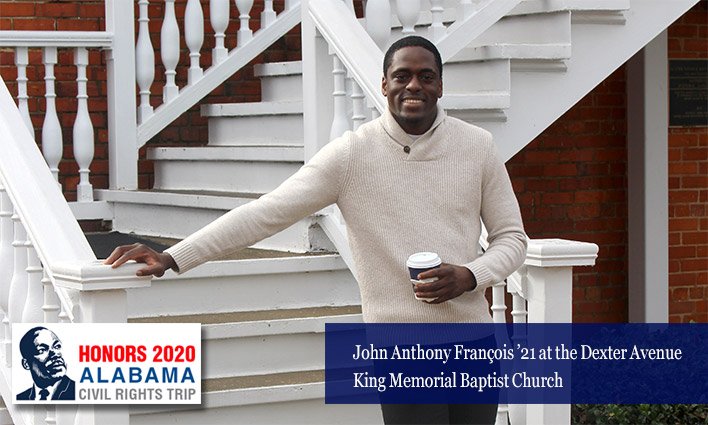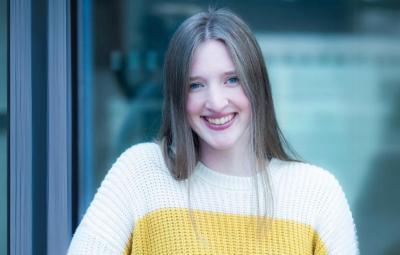
John Anthony François ’21, a Cell and Molecular Biology major and awardee of the Frederick Douglass Global Fellowship, felt such strong emotions during the Honors 2020 Alabama Civil Rights Trip that he started to question his own future career plans. After visiting The Legacy Museum—a gallery filled with exhibits, photographs, interactive media, and videography all depicting the painful history of our country’s domestic slave trade, racial terrorism, the Jim Crow South, and mass incarceration—François was visibly upset and withdrawn. Just knowing that where the museum stood, black people like himself were enslaved, warehoused, and tortured, horrified François. Should he abandon his love of science? Should he pick up the mantle of civil rights activists before him? To work out his feelings and understand his role in the fight for racial equality, François wrote this introspective essay.

His Essay
I would like to start this reflection by first thanking the Honors Program at John Jay College of Criminal Justice for the incredible opportunity that it has afforded my peers and myself over the past few days. The chance to visit Selma and Montgomery, Alabama and connect with my roots; the challenges presented to people of African descent living in the United States ever since we were forcibly brought here some two hundred plus years ago. It was an eye-opening experience that was physically, mentally, and emotionally draining, and yet it enriched us.
We departed New York City on a gray, dismal Monday morning—perhaps a foreshadowing of the dark history we were about to immerse ourselves into. I knew a bit about what we were going to see and hear. I had learned about “Bloody Sunday” on the Edmund Pettus Bridge in 1965, and the horrors of the mistreatment—a word that doesn’t come close to describing what actually happened—of African-Americans during the civil rights movement and slavery in my past studies. However, I never imagined the recount of these events that we would be exposed to would be as vivid as it was.

“Tears rolled down my eyes as I read the accounts of individuals subjected to racial segregation in the 20th century, and mass incarceration at present.” —John Anthony François
Visiting The Legacy Museum invoked intense feelings of anger, pain, sadness and an odd sense of hopelessness that I had never felt before, all at once. Tears rolled down my eyes as I read the accounts of individuals subjected to racial segregation in the 20th century, and mass incarceration at present. I realize that what I need to do from here on in is channel these feelings into something positive, so that I can use it for the advancement of my people.
Interestingly, the feelings I had were strong enough for me to consider changing my career path. I seriously pondered abandoning my quest for a Ph.D. in Cancer Biology and attending law school in the hopes of rectifying the injustices that many laws in this country impose on people of African descent. However, I eventually came to the realization that there are injustices in biomedical research that need just as much attention, because there aren’t many people who look like me and feel the same way that I do in the medical research field. So, I will focus my talents there, as I had originally planned.
All this being said, my experience over the past few days has been invaluable, and has given me the strength I need to continue pursuing my goals with unwavering diligence. The courage and tenacity that my ancestors demonstrated in the face of adversity has spurred me on. I should not, cannot, and will not give up. Here I go…



